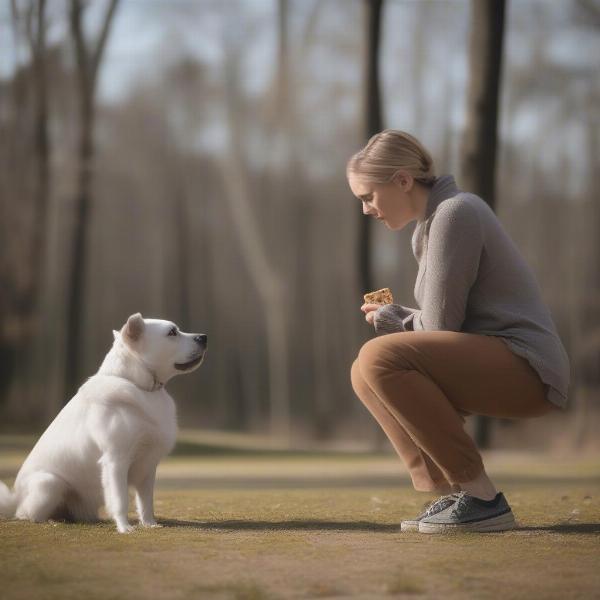Your dog just gobbled down a helping of fish food meant for your finned friend. Should you be worried? While a small amount of fish food is unlikely to cause serious harm, it’s important to understand the potential risks and monitor your dog for any unusual symptoms. This article will explore the potential dangers of dogs consuming fish food, what to do if your dog eats fish food, and how to prevent it from happening again.
Why Fish Food Isn’t Ideal for Dogs
While both fish and dogs need a balanced diet, their nutritional requirements are vastly different. Fish food is formulated to meet the specific needs of aquatic creatures, often containing high levels of certain nutrients that aren’t beneficial for canines. For example, fish food is typically rich in iodine and fatty acids like omega-3s. While omega-3s are generally good for dogs, excessive amounts can lead to digestive issues like diarrhea and vomiting. Similarly, too much iodine can disrupt a dog’s thyroid function. Another concern is thiaminase, an enzyme present in some raw fish and shellfish that can destroy thiamine (vitamin B1) in dogs. Although fish food often contains cooked fish, the risk of thiaminase remains if it incorporates raw fish ingredients.
What to Do If Your Dog Ate Fish Food
If your dog has eaten a small amount of fish food, there’s usually no need to panic. Monitor them closely for the next 24-48 hours, watching for signs of gastrointestinal upset like vomiting, diarrhea, loss of appetite, or lethargy. If these symptoms appear or persist, consult your veterinarian immediately.
If your dog consumed a large quantity of fish food, or if the fish food contains potentially harmful ingredients like raw fish or high levels of certain vitamins and minerals, contact your veterinarian immediately. They can advise you on the best course of action based on your dog’s breed, size, and the type of fish food ingested. In some cases, they may induce vomiting or recommend other treatments to minimize potential complications.
Preventing Your Dog from Eating Fish Food
The best way to deal with this issue is to prevent it from happening in the first place. Here are some simple steps you can take:
- Secure the fish food: Store fish food in a tightly sealed container in a cabinet or location your dog cannot reach.
- Supervise feeding time: When feeding your fish, supervise your dog and prevent them from accessing the fish tank or pond.
- Train your dog: Teach your dog commands like “leave it” or “no” to deter them from approaching the fish food.
- Feed your dog a balanced diet: A well-fed dog is less likely to be tempted by other food sources, including fish food. woof dog treats
 Dog Being Trained with Treats
Dog Being Trained with Treats
“Prevention is always better than cure,” says Dr. Emily Carter, DVM, a renowned veterinary nutritionist. “By taking proactive steps to secure fish food and train your dog, you can avoid potential health issues and ensure your furry friend stays happy and healthy.” Dr. Carter also emphasizes the importance of a balanced diet for dogs, suggesting that “providing your dog with appropriate whitefish dog food will meet their nutritional needs and reduce their inclination to scavenge for other foods.”
Conclusion
While a small nibble of fish food might not be a major cause for concern, it’s essential to understand the potential risks associated with dogs consuming fish food. By being vigilant, securing the fish food, and providing your dog with a balanced diet, you can protect your furry friend from potential harm and maintain their well-being. If you suspect your dog has ingested a large quantity of fish food or is exhibiting unusual symptoms, contact your veterinarian immediately.
FAQ
- Is fish food toxic to dogs? While not inherently toxic in small quantities, fish food can cause digestive upset and potential health problems due to its different nutritional composition compared to dog food.
- What should I do if my dog eats a lot of fish food? Contact your veterinarian immediately for advice.
- Can fish food cause pancreatitis in dogs? The high fat content in some fish foods could contribute to pancreatitis in susceptible dogs.
- Will eating fish food once hurt my dog? A small amount is unlikely to cause serious harm, but monitor your dog for any unusual symptoms.
- How can I keep my dog away from the fish tank? Secure a lid on the tank, use a deterrent spray around the area, or train your dog to stay away.
Related Articles on ILM Dog
About ILM Dog
ILM Dog (https://ilmdog.com) is your one-stop resource for expert advice on dog breeds, health, training, nutrition, grooming, and much more. We provide reliable, practical information to help dog owners worldwide provide the best possible care for their furry companions. From choosing the right breed to navigating the complexities of canine health, ILM Dog offers comprehensive guidance for both new and experienced dog owners. Contact us for personalized advice and support via email at [email protected] or phone at +44 20-3965-8624.